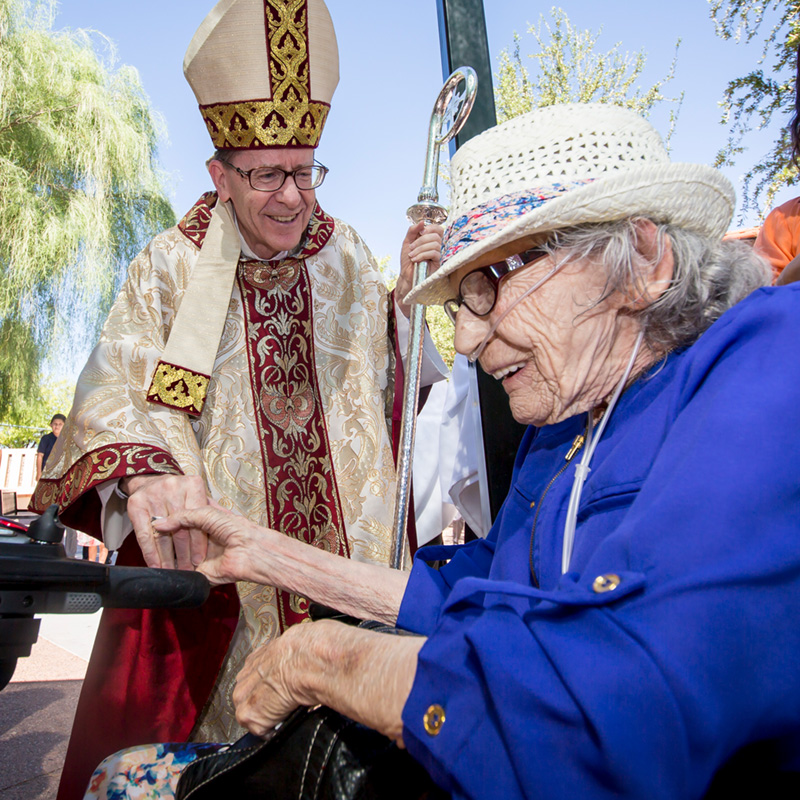Following is the prepared text from Bishop Thomas J. Olmsted’s homily for the 14th Sunday of Ordinary Time.
July 8, 2018
“The Lord said to me, ‘My grace is sufficient for you, for power is made perfect in weakness.’” 2 Cor 12:8
Many years ago, a weary pilgrim trudged up the steep path that leads from the Tiber River in Rome to the 15th century Church of Sant’Onofrio on the Gianicolo hill. After praying there, the pilgrim carved three words on the doorpost: “Piango, prego, spero.”
We don’t know anything about the pilgrim except for those three Italian words, which translate: “I weep, I pray, I hope.” Only three words, and yet they tell us a great deal about the pilgrim, and what the Lord had done for him in the quiet interior of Sant’Onofrio Church. Maybe the pilgrim was a widow whose husband and been killed—she wept tears of grief. Perhaps a man weighed down with guilt and sorrow wept tears of contrition. Maybe a father was mourning a tragic misfortune suffered by a daughter or son—tears of grief.
Whatever the reason, the pilgrim came to Sant’Onofrio to pray: to be with God, to pour out his sorrow, or to lay bare his grief, to seek in God’s presence what could not be found anyplace else. “Piango, prego, spero.” I weep, I pray, I hope.
In St. Paul’s Second Letter to the Corinthians (2 Cor 12:7-10), the Apostle tells us about his prayer at a particularly tough time in his Apostolic mission. He writes: “…a thorn in the flesh was given to me …to keep me from being too elated [too proud]. Three times I begged the Lord about this, that it might leave me, but He said to me. ‘My grace is sufficient for you, for power is made perfect in weakness.’”
From St. Paul and from the pilgrim in Rome, we learn three things about prayer during times of hardship and distress: First, in prayer you make your needs known to God. You open your heart to the Lord. You beseech, plead, beg, weep, cry out—remembering who you are: a creature coming to his or her Creator, a son or daughter turning to the Father. St. Paul writes, “With sighs too deep for words,” the Holy Spirit “helps us in our weakness, for we do not know how to pray as we ought, but the Spirit Himself intercedes for us with sighs too deep for words” (Romans 8:26).
The Lord urges us to come to Him as we are, to be honest and spontaneous. Jesus urges us to pray like a child, no matter our age: “Ask and it will be given to you, seek and you will find; knock and the door will be open to you.”
The second thing we learn from St. Paul about prayer is to be a good listener. The Apostle thought God loved him so much that He would take away his pain. He just needed to keep asking. So, he writes, “Three times I begged the Lord about this, that it might leave me, but He said to me, ‘My grace is sufficient for you, for power is made perfect in weakness.’” We don’t know how much time passed between each of these three times that Paul begged God to relieve him of a “thorn in the flesh.” Each time of begging was a sustained outpouring of the heart; it might have gone on for weeks, months or longer. Paul was not a man to give up easily—even when begging God.
Now, no one knows exactly what the “thorn in the flesh” was, which Paul begged God to remove. Some say it was a recurring temptation in which Satan was relentless and Paul was becoming exhausted, even discouraged. Others say it was a physical malady which caused constant pain and slowed down his travels—something like the open wound on St. Junipero Serra’s leg which crippled him, for years, throughout his missionary efforts in Mexico and California. Still others conjecture that it was enemies of the faith who opposed Paul’s efforts to bear witness to the Good News of Jesus Christ.
No matter what it was, we see that Paul learned to listen for a message from God beyond what he was begging for. Eventually, Paul writes that He heard Christ say, “My grace is sufficient for you, for power is made perfect in weakness.”
That brings us to the third thing we learn from St. Paul through prayer: to trust in the Lord, at all times, even when we don’t understand, especially when we don’t understand. We learn most about prayer, however, through the example of Jesus: e.g. how He prayed during His agony in the Garden of Gethsemane, how He begged the Father three times, “Father, let this cup pass me by, yet not my will but Thy will be done.” In the moment of His greatest agony, Jesus begged His Father to save Him from the Cross, but He added with childlike trust, “Yet not my will but Thy will be done.” Perhaps it was after meditating on Jesus’ agony in the Garden that Paul clearly heard the Father say, “My grace is sufficient for you, for power is made perfect in weakness.”
Could it be that the pilgrim in Sant’Onofrio heard something like that as he prayed, centuries ago? Heard it so clearly that he could not just walk back down the Gianicolo hill; he had first to carve three words on the doorpost for others to read; words that still speak to us today: Piango, prego, spero. I weep, I pray, I hope. I pour out my tears to the Lord; I pray for His consolation. I find hope and renewed trust in Him, for He is indeed my Father.





